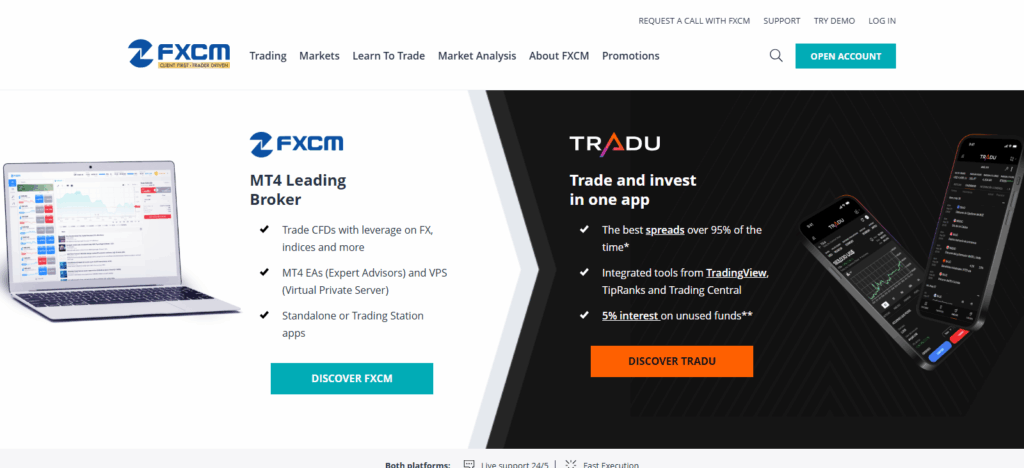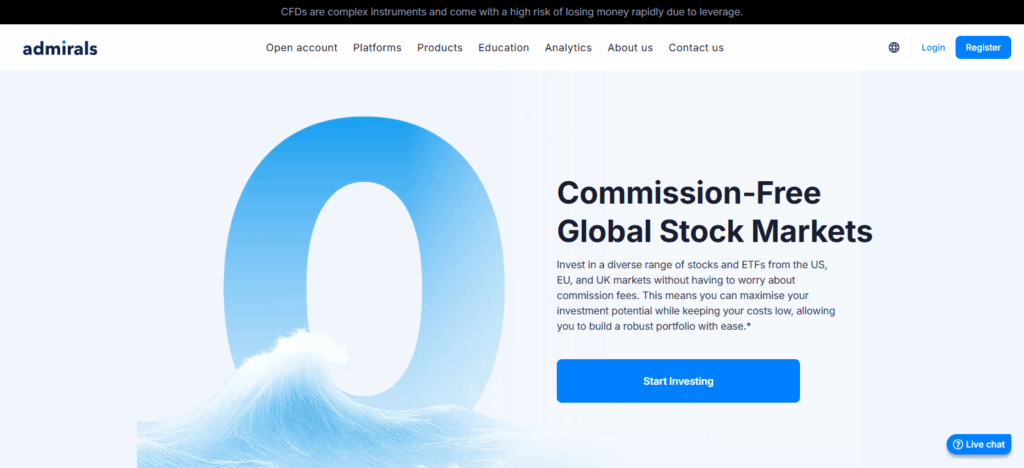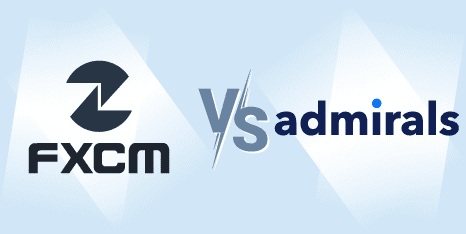In this article, I will look at the differences between FXCM and Admirals focusing on features, fees, platforms, and trading conditions.
Both brokers are global and offer solid tools for forex and CFD trading while being regulated. This will help you distinguish between the two and select the broker that best meets your trading goals and range of pricing.
What is FXCM?
Forex Capital Markets (FXCM) is a UK based online forex and CFD broker established in 1999. It office in London. The Company is responsible for providing investors access to different financial markets like the forex market, and commodities including the cryptocurrencies, indices and others.
The Company has had impact on all the financial markets in the country and all over the world concerning policies effecting transparent pricing and the advanced trading technology.

With all this the Company has also developed a base of highly qualified personnel who can work on platforms like the Meta Trader as well as train beginner to use the beginner platforms.
All this has make the Company and all the permits they have make the all advanced analytic tools and the strong market research they have very make the Company to be a Company of very high trust concerning their clients all over the world.
What is Admirals?
Admirals is an online broker that has been in operation since 2001. Originally known as Admiral Markets, the company is headquartered in Tallinn, Estonia, and has expanded its offerings to include trading in forex, stocks, indices, commodities, ETFs, and cryptocurrencies.

As one of the world’s online brokers, ongoing attention to security and transparency is sure to come from regulators like the FCA (UK), ASIC (Australia), and CySEC (Cyprus). Admirals provides clients with the highly regarded MetaTrader 4 and MetaTrader 5 trading platforms with sophisticated tools, analytics, and advanced risk management features.
Educating clients and enhancing the overall trading experience is the best value a company can provide to its increasingly global clientele. Admirals delivers on these promises and so much more.
Key Differences Between FXCM vs Admirals
| Category | FXCM | Admirals |
|---|---|---|
| Founded | 1999 | 2001 |
| Headquarters | London, United Kingdom | Tallinn, Estonia |
| Regulation | FCA (UK), ASIC (Australia), FSCA (South Africa) | FCA (UK), ASIC (Australia), CySEC (Cyprus), JSC (Jordan) |
| Trading Platforms | MetaTrader 4, Trading Station, TradingView | MetaTrader 4, MetaTrader 5, Admirals App |
| Tradable Instruments | Forex, Indices, Commodities, Crypto CFDs | Forex, Stocks, Commodities, Indices, ETFs, Crypto CFDs |
| Account Types | Standard, Active Trader | Trade.MT5, Zero.MT5, Invest.MT5 |
| Minimum Deposit | $50 | $25 |
| Spreads | From 1.3 pips (variable) | From 0.0 pips (Zero Account) |
| Commission | None on Standard, commission on Active Trader | Zero Account has commission, others are spread-based |
| Leverage | Up to 1:400 (depending on region) | Up to 1:500 (depending on region) |
| Education & Research | Market insights, webinars, trading guides | Extensive education hub, webinars, analytics |
| Customer Support | 24/5 via live chat, email, phone | 24/5 via live chat, email, multilingual support |
| Best For | Active traders and professionals | Beginners to advanced traders seeking multi-asset trading |
Which Broker is Better?
When Admirals may be the better option
- Admirals has good reviews on its trustworthiness coupled with its regulatory standing. One review labelled it “very trusted” and holding authorisations from several important regulators which include the Australian Securities and Investments Commission, the Financial Conduct Authority, and MiFID-regulated entities.
- In more instances, it provides a greater range of assets which includes stocks, ETFs, commodities, and forex. This is a good option if you prefer multi-asset trading as opposed to just forex/CFDs.
- In terms of “advanced educational resources,” Admirals probably focuses more on educational resources if you’re a newer trader and appreciate support.
- Some testimonials point to positive customer support and worthwhile spreads.
When FXCM might be the better choice
- FXCM has a long history (since 1999) and offers a variety of platforms (including proprietary and third-party) which can be appealing to more experienced traders.
- If your focus is more purely on forex/CFD trading and you value platform flexibility (MT4/MT5 etc) and strong execution, FXCM may tick more of your boxes.
- Good customer service feedback: reviewers highlighted helpful staff, straightforward deposit/withdrawal processes with FXCM.
Fees and Spreads
FXCM
On Standard accounts, FXCM primarily adopts a spread-only approach and does not charge a commission for trades. For Standard accounts, the average spread for the EUR/USD pair is about 1.3 pips.
For its Active Trader account type or region-specific pricing models, the spreads are much tighter (about 0.3 pips for EUR/USD) but a commission charge applies. Inactivity fees and inactivity-related account closure fees are the only non-trading fees, and many accounts have no deposit or withdrawal fees.
Admirals
With different account pricing models, Admirals has a wider variety of accounts. For the “Trade” accounts (without a commission), average spreads for EUR/USD are about 0.5-0.8 pips.
However, on the ‘Zero accounts’ (with commissions), spreads for EUR/USD can get tighter, around 0.0-0.1 pips, and a commission is charged on those trades (approximately $3 per lot per side). Additional inactivity fee (€10/month after 24 months of inactivity) and a currency conversion fee (around 0.3%) may be charged.
Pros and Cons
Pros & Cons FXCM (Forex Capital Markets)
Pros:
- Regulated by major authorities (e.g., Financial Conduct Authority (FCA) UK, Australian Securities & Investments Commission (ASIC)).
- Multiple platform support (e.g., MetaTrader 4, proprietary Trading Station, etc.) giving flexibility.
- Good educational resources, useful for both beginners and more advanced traders.
- Competitive trading conditions for many instruments (tight spreads, good execution) especially for active traders.
Cons:
- Product offering is somewhat limited compared to multi-asset brokers (focus on forex & CFDs rather than full range of stocks/ETFs).
- Inactivity fees, and some higher withdrawal or non-trading fees.
- Some users report lesser variety of account types or features compared to more specialist brokers.
- Not always the very lowest spreads unless you fit the “active trader” profile.
Pros & Cons Admirals (formerly Admiral Markets)
Pros:
- Very broad range of instruments: forex, stocks, ETFs, indices, commodities, cryptos.
- Strong regulatory oversight across multiple jurisdictions.
- Good educational and research resources, helpful for traders wanting learning and support.
- Offers competitive pricing depending on the account type used, including zero-spread or tight-spread accounts (ForexBrokers.com)
Cons
- Inactivity fees may affect less-active traders .
- Mobile apps or some components of the platform may not be the very best in class .
- Certain account types (i.e. those with the tightest spreads) may have higher minimum balance requirements or commissions .
- In some areas, the seamlessness of deposit/withdrawal methods or funding options may be limited or not as extensive .
Conclusion
FXCM and Admirals are both reputable and well-regulated brokers that are strong trading environments. However, they each have slightly different catered needs. Due to its long-standing reputation, dependable execution, and several different trading platforms, FXCM is a broker of choice for more experienced and forex-focused traders. Admirals, on the other hand, because of their broader market access including stocks,
ETFs, and cryptocurrencies, is the broker of choice for traders looking to diversify across multiple assets. Moreover, for beginners, Admirals stands out because of its educational resources and impressive analytical tools. In summary, those who seek speed and primarily trade forex will prefer FXCM, while those who desire flexibility, more options, and an all-inclusive trading experience will prefer Admirals.
FAQ
Is the broker regulated and safe?
es — FXCM is regulated by the UK’s Financial Conduct Authority (FCA), Australia’s Australian Securities and Investments Commission (ASIC) and other authorities.
What platforms does FXCM offer?
It supports its proprietary Trading Station platform, MetaTrader 4 (MT4), TradingView, and APIs for custom trading.
Can Indian residents use Admirals legally?
While Indians may open accounts, regulations in India restrict certain kinds of forex trading through foreign brokers — local legality may be uncertain.









